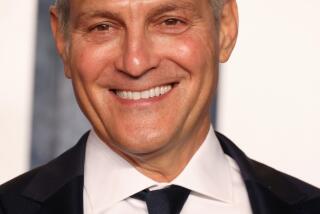Last-Hired CEO Faces Unique Hurdles
Frank Biondi’s hiring this week as chief executive of MCA Inc. is unusual for one major reason: He’s the last piece of the executive puzzle to fall into place, not the first.
Usually, filling the chief executive spot is the first step toward revitalizing a company. From there, the new CEO, enjoying the luxury of a blank slate, handpicks a new team, often filling slots with long-trusted executives who go back with the CEO in previous jobs.
One can’t blame Seagram Chief Executive Edgar Bronfman Jr. In the 10 months since buying control of MCA, he unsuccessfully courted such executives as Michael Ovitz, Barry Diller and Terry Semel. Eventually, he recruited agent Ron Meyer as president, letting him run the place before taking advantage of Biondi’s firing by Viacom Inc. to bring him in as Meyer’s boss.
As a result of his late hiring, Biondi faces several unique hurdles at MCA most executives don’t face coming into a new job. For one, he had no say in recent hirings of any of the major executives below him. As a general rule, it’s easier to gain loyalties from people who owe you their jobs and Biondi isn’t likely to replace executives who have just arrived.
Also lacking are many executives at high levels who have been at the company for more than a year--Chairman Emeritus Lew Wasserman being the noted exception. That diminishes the kind of institutional experience new executives frequently find valuable to tap.
In addition, Meyer got a taste of what it was like to run the company and put together the core executive team himself. It speaks well of Meyer’s ego that he’s handled it diplomatically and he appears to have no problem with Bronfman’s bringing in Biondi. Biondi and Meyer admit they didn’t know each other well, but so far they’ve done and said all the right things despite the fast courtship.
Biondi also has to establish quickly to Hollywood that Bronfman is letting him call the shots. Biondi enjoys the advantage of having experienced what it was like to work under an owner before when he answered to Viacom Inc. Chairman Sumner Redstone for 10 years.
Still, Bronfman has his own well-established relationships in Hollywood, such as with DreamWorks SKG partners Steven Spielberg, Jeffrey Katzenberg and David Geffen. Both Biondi and Bronfman will be tested the first time someone tries to do an end run around Biondi.
Biondi also is setting up shop at MCA’s Universal lot at a time when the company has already been launched on an extensive “re-engineering” program to review from top to bottom all of its methods of doing business. It’s something that Bronfman did at Seagram and is unique to entertainment. And, Biondi has to dispel any notion that as a New York entertainment executive he’s an outsider in Hollywood, which shouldn’t be hard to do given that he knows most of the players.
Finally, Biondi has to do what he can to shed the “laid-back” label Redstone unfairly hung on him in media comments when he fired Biondi in January as chief executive of Viacom.
Redstone probably didn’t realize the damage that kind of casual remark can have on a top executive’s reputation when he said it in an offhand way to reporters. Unfortunately for Biondi, it quickly became the short answer to the question “Why was he fired?” and was repeated in virtually every rehashing of what happened.
It’s hard to think of someone as laid-back when he played such a key role in meshing three multibillion-dollar entertainment giants as he and Redstone did in merging Viacom, Paramount Communications Inc. and Blockbuster Entertainment Corp. Merging two companies, let alone three, isn’t a job for a laid-back guy.
Meyer faces a similar challenge in somehow shedding the “nice guy” label he’s been stuck with. Not that it’s bad to be nice, or even to be laid-back. But at a company where tough decisions must be made to contain costs so languishing profit margins can be boosted, no one wants to be thought of as an easy mark.
Biondi said that an executive doesn’t have to be a screamer to get results, citing his track record at Viacom, Home Box Office Inc. and at Coca-Cola Co.’s entertainment operations.
Adds Meyer about the “nice guys” label: “I keep hearing it. We’re complimented by being called nice guys. But nobody should ever mistake nice for weakness.”
*
Polone update: In one of the quicker resolutions to a firing dispute, ousted United Talent Agency television agent Gavin Polone has settled his differences with the agency. He’s getting an undisclosed amount of money and an admission that the agency had no cause to ax him.
Polone, who at UTA represented such clients as screenwriter David Koepp (“Jurassic Park”) and “Seinfeld” co-creator Larry David, was fired Sunday, with the agency suggesting it was due in part to how Polone treated fellow agent Nancy Jones, who worked under him. Jones took a job on Thursday in the TV department of Creative Artists Agency.
Polone’s lawyers at Sidley & Austin, led by Peter Ostroff, negotiated with UTA partner Jim Berkus. Late Wednesday, with a Sidley & Austin employee at the courthouse on an open phone line waiting for the go-ahead to file a lawsuit, the two sides settled.
As part of the settlement, UTA issued a statement saying, “Upon further investigation, we have determined that there were insufficient grounds to terminate” Polone for cause.
Not surprisingly, the statement also blames the entertainment media for merely reporting the agency’s own spin. “We regret any misconception created as a result of the reporting of these events in the media,” the statement read.
More to Read
Inside the business of entertainment
The Wide Shot brings you news, analysis and insights on everything from streaming wars to production — and what it all means for the future.
You may occasionally receive promotional content from the Los Angeles Times.










